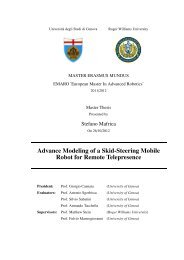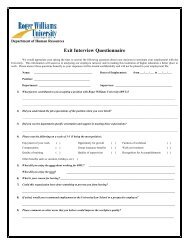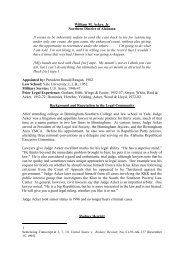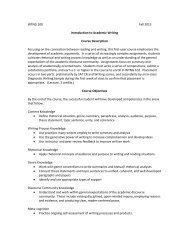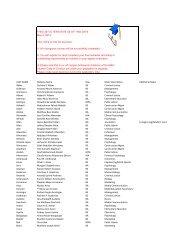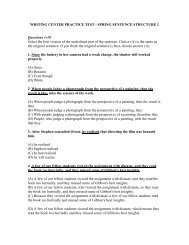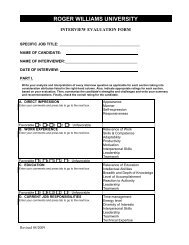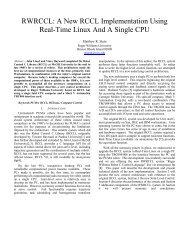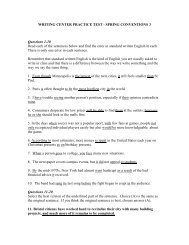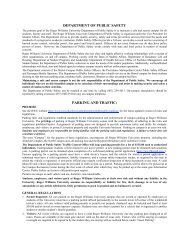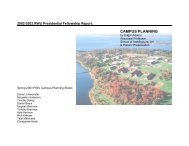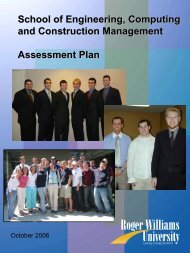Ira DeMent Middle District of Alabama Now you come to the ...
Ira DeMent Middle District of Alabama Now you come to the ...
Ira DeMent Middle District of Alabama Now you come to the ...
Create successful ePaper yourself
Turn your PDF publications into a flip-book with our unique Google optimized e-Paper software.
<strong>Ira</strong> <strong>DeMent</strong><strong>Middle</strong> <strong>District</strong> <strong>of</strong> <strong>Alabama</strong><strong>Now</strong> <strong>you</strong> <strong>come</strong> <strong>to</strong> <strong>the</strong> Sentencing Guidelines, which I don’t like ei<strong>the</strong>r, if<strong>you</strong> want <strong>to</strong> know <strong>the</strong> truth. . . . And <strong>the</strong>y will never undo <strong>the</strong>m . . .because <strong>the</strong> bureaucracy is dug in, and <strong>the</strong>y have laid triple concertinaand double apron strand <strong>of</strong> barbed wire, and it continues <strong>to</strong> grow. Andit’s <strong>the</strong> law and I must follow it, so that my answer <strong>to</strong> <strong>you</strong> . . . 1Appointed by: President George H.W. Bush, 1992.Law School: Univ. <strong>of</strong> <strong>Alabama</strong>, J.D. 1958.Military Service: U.S. Army & Air Force Active & Reserve (Maj. Gen.-Ret.), 1953-74.Prior Legal Experience: Calvin M. Whitesell, 1961-62; Whitesell & <strong>DeMent</strong>, 1962;Whitesell, Al<strong>to</strong>n & <strong>DeMent</strong>, 1962-65; <strong>DeMent</strong> & Wise, 1982-87; Solo-practitioner,1965-69, 1977-82, 1987-92.Government Service: Assistant U.S. At<strong>to</strong>rney 1959-61; Assistant City At<strong>to</strong>rney, City <strong>of</strong>Montgomery 1965-69; U.S. At<strong>to</strong>rney 1969-77.Background and Reputation in <strong>the</strong> Legal CommunityJudge <strong>DeMent</strong> attended Marion Military Institute and <strong>the</strong> University <strong>of</strong> <strong>Alabama</strong>. Heserved in <strong>the</strong> United States Army in <strong>the</strong> Infantry and in <strong>the</strong> Air Force with <strong>the</strong> JudgeAdvocate General. For his military service, he was awarded <strong>the</strong> Meri<strong>to</strong>rious ServiceAward, Legion <strong>of</strong> Merit, and <strong>the</strong> Air Force Distinguished Service Medal. He is a lifemember <strong>of</strong> <strong>the</strong> Air War College Alumni Association and <strong>the</strong> Air War CollegeFoundation.During his legal career, Judge <strong>DeMent</strong> rose <strong>to</strong> be<strong>come</strong> a name partner in several firms aswell as engaging in periods <strong>of</strong> solo practice. Before being appointed <strong>to</strong> <strong>the</strong> federal bench,Judge <strong>DeMent</strong> was also an Assistant City At<strong>to</strong>rney, an Assistant United States At<strong>to</strong>rney,and for eight years, <strong>the</strong> appointed United States At<strong>to</strong>rney for <strong>the</strong> <strong>Middle</strong> <strong>District</strong> <strong>of</strong><strong>Alabama</strong>. As a lawyer and now as a judge, Judge <strong>DeMent</strong> has been active in his local andstate bar and in several national legal associations.Lawyers say that Judge <strong>DeMent</strong> has outstanding legal skills. One lawyer noted that he“revels in <strong>the</strong> more academic stuff, but he has a lot <strong>of</strong> experience in <strong>the</strong> trenches <strong>to</strong>o. It’sa good combination, and he puts it <strong>to</strong> good use.” Ano<strong>the</strong>r said, “He can be very exacting.He requires everyone <strong>to</strong> behave courteously and pr<strong>of</strong>essionally.” In trial, lawyers notethat his military background <strong>come</strong>s through, saying things such as, “He makes <strong>the</strong> trainsrun on time.” “He runs a very tight ship.”Both civil and criminal lawyers consider him fair. One lawyer said that Judge <strong>DeMent</strong>“can’t help but lean a little <strong>to</strong>ward <strong>the</strong> prosecution given his background, but I wouldn’t1 United States v. Kenneth S<strong>to</strong>vall, Sent. Tr. at 12-13, No. 92-064 (M.D. AL, July 2, 1992)[<strong>the</strong>judge corrected typographical errors in <strong>the</strong> transcript by letter <strong>to</strong> author, February 1, 2004].
on how <strong>to</strong> complete <strong>the</strong> transaction, and that it was Kenneth, not Aiken, who was <strong>the</strong> “bigman.”Aiken also revealed that he, Kenneth, Phifer, and Moore had been in a room at <strong>the</strong>Villager Inn before <strong>the</strong> deal. A search <strong>of</strong> <strong>the</strong>ir room at that motel yielded a bag with 73.9more grams <strong>of</strong> crack cocaine. All five men were eventually indicted for conspiracy <strong>to</strong>distribute and distribution <strong>of</strong> crack (for <strong>the</strong> Howard Johnson sale), possession with intent<strong>to</strong> distribute crack cocaine (for <strong>the</strong> drugs found at <strong>the</strong> Villager Inn), and possession <strong>of</strong> afirearm during a drug trafficking <strong>of</strong>fense (for <strong>the</strong> gun under Aiken’s seat).Several <strong>of</strong> <strong>the</strong> defendants, including Kenneth, wanted <strong>to</strong> cooperate in exchange for alesser sentence. Kenneth even agreed <strong>to</strong> be interviewed by <strong>the</strong> government without anyadvance promises <strong>of</strong> leniency. Unfortunately, Kenneth’s lawyer chose not accompanyhim <strong>to</strong> this “pr<strong>of</strong>fer interview” with <strong>the</strong> prosecu<strong>to</strong>r, out <strong>of</strong> concern that he “might berepresenting some <strong>of</strong> <strong>the</strong> individuals” that Kenneth might mention and he did “not want<strong>to</strong> have a conflict.” 4 Thus, Kenneth did not have <strong>the</strong> benefit <strong>of</strong> counsel <strong>to</strong> help himnegotiate his way. In fact, before <strong>the</strong> interview, Kenneth’s lawyer <strong>to</strong>ld <strong>the</strong> prosecu<strong>to</strong>r hecould talk <strong>to</strong> Kenneth about drugs, but not about <strong>the</strong> gun that was recovered from <strong>the</strong> car,apparently out <strong>of</strong> a misguided concern that this information might be used againstKenneth later on. 5 In fact, at sentencing, <strong>the</strong> government alluded <strong>to</strong> this condition as onereason that Kenneth was not <strong>of</strong>fered a cooperation agreement, 6 although given Howard’sinitial claim that Kenneth was <strong>the</strong> “big man,” it is not clear that <strong>the</strong> prosecu<strong>to</strong>r wouldhave wanted Kenneth <strong>to</strong> testify against his co-defendants under any circumstances. 7It is also unclear whe<strong>the</strong>r Kenneth was given an opportunity <strong>to</strong> plead guilty <strong>to</strong> lower hissentencing exposure. At <strong>the</strong> sentencing hearing, <strong>the</strong> prosecu<strong>to</strong>r claimed that he had amade a plea <strong>of</strong>fer which Kenneth’s at<strong>to</strong>rney rejected, an assertion that Kenneth’s at<strong>to</strong>rneyhotly contested. 8 What is clear is that Kenneth’s co-defendant, Phifer, was able <strong>to</strong>4 Sent. Tr. at 19.5 His at<strong>to</strong>rney argued at sentencing that he would have been giving up his right <strong>to</strong> a jury trial if hehad made “a pr<strong>of</strong>fer statement that he doesn’t know whe<strong>the</strong>r <strong>the</strong>y are going <strong>to</strong> accept it or not. . . .” and that<strong>the</strong> government had tried <strong>to</strong> “forc[e] him <strong>to</strong> testify against himself, and with no promises whatsoever unlesshe signs an agreement.” Sent. Tr. at 30. Judge <strong>DeMent</strong> clarified this point at sentencing by assuringhimself that <strong>the</strong> government did not in fact use any “<strong>of</strong> <strong>the</strong> information that [Kenneth] gave [<strong>the</strong>government] against him on <strong>the</strong> trial <strong>of</strong> this case.” Sent. Tr. at 30.6 In arguing that Kenneth should not get a reduction for acceptance <strong>of</strong> responsibility, <strong>the</strong>prosecu<strong>to</strong>r stated that “He admitted partial participation, we still have <strong>the</strong> matter <strong>of</strong> <strong>the</strong> gun which Mr. Bell<strong>to</strong>ld his client not <strong>to</strong> talk about. I think that’s <strong>the</strong> whole problem with this case, each <strong>of</strong> <strong>the</strong> Defendantswanted <strong>to</strong> talk about little specific instances instead <strong>of</strong> <strong>the</strong> whole thing. . . .” Sent. Tr. at 49.7 Both sides agreed that, in his pr<strong>of</strong>fer interview, Kenneth provided <strong>the</strong> name <strong>of</strong> his supplier inMississippi and some o<strong>the</strong>r individuals who were selling drugs in <strong>the</strong> Montgomery area. The governmentmaintained that it already knew <strong>of</strong> <strong>the</strong>se people and that no arrests or prosecutions resulted from Kenneth’sinformation, thus he was not entitled <strong>to</strong> a government motion for substantial assistance. Sent. Tr. at 24.8 The prosecu<strong>to</strong>r stated that he <strong>of</strong>fered <strong>to</strong> let Kenneth plead <strong>to</strong> certain counts and “we wouldreduce his sentence by a certain amount.” Sent. Tr. at 26. Kenneth’s at<strong>to</strong>rney asserted no plea <strong>of</strong>fer was
half,” and that he unders<strong>to</strong>od. 17When allowed <strong>to</strong> allocute, Kenneth expressed his distress that his co-defendants madehim out <strong>to</strong> be <strong>the</strong> leader. He claimed that “I did not tell anybody <strong>to</strong> do nothing for me. . .. And Mr. Phifer testified that everybody was talking <strong>to</strong> me when <strong>the</strong>y was talking <strong>to</strong> Mr.Aiken and me, <strong>you</strong> know what I am saying. It was all <strong>of</strong> us <strong>to</strong>ge<strong>the</strong>r. . . . [T]hey werelocked up <strong>to</strong>ge<strong>the</strong>r, <strong>the</strong>y got <strong>the</strong>ir s<strong>to</strong>ries <strong>to</strong>ge<strong>the</strong>r against me.” 18Kenneth was born in Montgomery but his parents moved north before he was five. Whenhe was eight, his parents moved <strong>to</strong> Grand Ledge, Michigan, where by high school, he hadbe<strong>come</strong> a budding football star. 19 However, his fa<strong>the</strong>r <strong>the</strong>n left <strong>the</strong> family, “causing us <strong>to</strong>be<strong>come</strong> very poor.” 20 His mo<strong>the</strong>r chose <strong>to</strong> remarry and he moved <strong>to</strong> California with herand her new husband. He writes that his Michigan community was predominantly whiteand stable, whereas in California, it was mixed crowd, “with a very fast environment.” 21Thus, although he graduated from high school, he suffered setbacks in school and infootball from “<strong>the</strong>se environmental changes.” 22After high school, Kenneth moved <strong>to</strong> Atlanta <strong>to</strong> work in his fa<strong>the</strong>r’s constructionbusiness, but he started drinking and using marijuana, “which eventually [led] <strong>to</strong> sellingdrugs.” 23 He left Atlanta for Montgomery for three years and <strong>the</strong>n moved back <strong>to</strong>California <strong>to</strong> go <strong>to</strong> community college and pursue football again. He came back <strong>to</strong>Montgomery for a holiday break and got involved in <strong>the</strong> deal that lead <strong>to</strong> his conviction.Kenneth says that he realizes that his crime was not victimless and that it had harmed <strong>the</strong>community. He believes now that “five years would have served <strong>the</strong> public and myselfproperly.” 24 In prison, he has completed nearly every adult continuing education17 Sent. Tr. at 39-40.18 Sent. Tr. at 38. Although Kenneth did not testify at trial, at sentencing Kenneth’s lawyer fur<strong>the</strong>rpr<strong>of</strong>fered that Howard had set up this deal without Kenneth, who was not even in <strong>to</strong>wn at <strong>the</strong> time <strong>of</strong> <strong>the</strong>initial contact. He explained that Kenneth just happened <strong>to</strong> be at <strong>the</strong> home <strong>of</strong> “Derrick,” who was supposed<strong>to</strong> be <strong>the</strong> supplier for <strong>the</strong> deal, when Howard called that day. When “Derrick” was unable <strong>to</strong> provide <strong>the</strong>crack Howard needed, Kenneth stepped in<strong>to</strong> his role. Sent. Tr. at 6. Even under this version <strong>of</strong> events,however, Judge <strong>DeMent</strong> could have considered Kenneth a leader or organizer under <strong>the</strong> Guideline’sdefinition <strong>of</strong> <strong>the</strong>se terms. However, <strong>the</strong> government added that its evidence was that Kenneth had rented<strong>the</strong> room at <strong>the</strong> Villager Inn and directed <strong>the</strong> transaction as it occurred by phone and <strong>the</strong> judge accepted thisversion <strong>of</strong> <strong>the</strong> events for purposes <strong>of</strong> this sentencing enhancement. Sent. Tr. at 10.19 December 13, 2006 letter <strong>to</strong> author at 1 (on file with author).20 Id. at 2.21 Id.22 Id. at 1.23 Id.24 Id.



